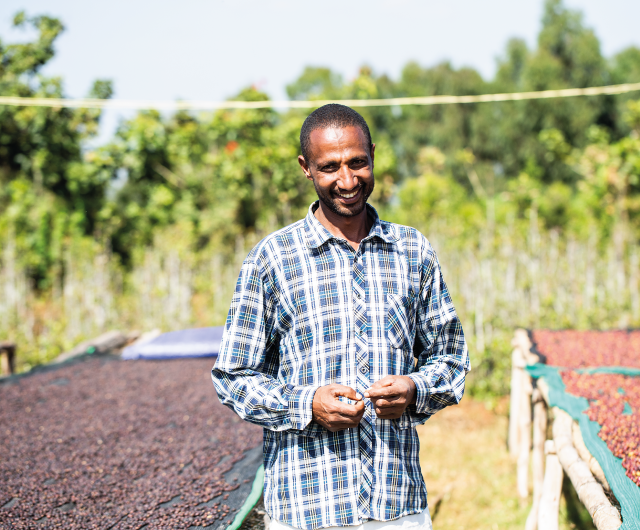
The Khalid Shifa interview
Khalid Shifa is a Kaffa producer from the Jimma region of Ethiopia. For many years now, his coffees have been one of our pride and joy. It was only natural to give him the floor.
Hello Khalid, can you introduce yourself?
My name is Khalid Shifa and I was born in Echemo, in the Jimma area, in the Wereda (district) of Gomma, and the Kebele (village) of Beshasha. I started working in coffee when I was very young, on my grandfather's and father's farm.
The family farm grew and I took over, supplying the local market. Five years ago, I obtained my export license and made my first sale to BELCO. Today, I produce fully washed (Grade 1 and 2), plain (Grade 1 and 3) and honey (Grade 1) coffees. They are all certified organic, exclusively for import by BELCO.
How long have you been working with Belco?
I've been working with BELCO for over 5 years now. In fact, ever since I sold a Grade 3 Nature container in 2017.
What investments have you made in your farm? What resources did you use before and now?
Initially, I started working on the family farm with a license to sell on the local market. I started exporting 5 years ago and invested in three sites in the Jimma area:
Gera
- 2 washing stations with a total area of 1.8 hectares
- 120 drying beds and a production capacity of 15 trucks per year.
- For the first three years, I rented this site, but I recently bought it thanks to a bank loan representing 30% of the purchase price.
Bedeyi
- a third drying station with 3 hectares
- 200 beds
- Two years ago, I was able to buy this site from the government and borrowed money to buy an AGARD machine. This station delivers enough processed coffee to fill 20 to 25 trucks.
Echemo
- Dry mill and honey process station
- 110 beds
- A PENAGOS pulper.
I also built a large storage and hulling area on property I obtained from the government and paid for with a bank loan. This required an investment of around 14 million birr (€260k).
I took the decision to invest in washing and drying stations so as to be able to supply more coffee to local and international markets. One of my challenges was the absence of a certified organic hulling station within a reasonable distance of the station. So I invested in a hulling station and a warehouse to store the coffee until it was ready for export.
In your opinion, what are the advantages of being an exporter?
Exporting coffee is a lucrative business, mainly for specialty coffees, but for commercial-grade coffees, the local market price is often higher than the international price, so we lose money in this case. What's more, as we bring in foreign currency, exporters benefit from bank loans at lower interest rates.
What investments are planned next?
I intend to invest in a larger coffee farm and other projects that will enable me to maintain sustainable, high-quality coffee sourcing while producing more. I'm currently in the process of buying another coffee plantation.
Did you like this article? Share it with your community:
